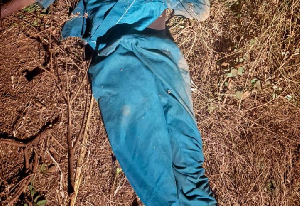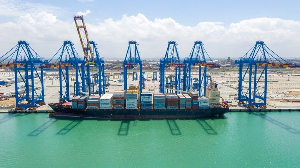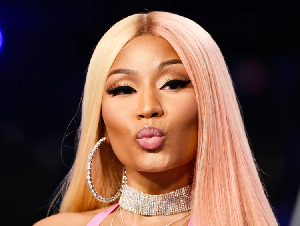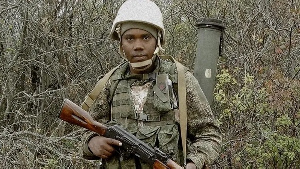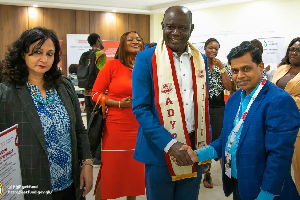TROKOSI: An Opportunity to Abuse Women and Girls in the Name of Religion and Culture.
Part 3.
Attempts have been made to justify the practice of Trokosi under the pretext of religion and culture. Simply put, this assertion simply does not wash with me because, I categorically do not accept the fact that, innocent young virgin girls should be punished for crimes which were committed by their fathers, uncles and grandfathers via a lifetime of enslavement at the hands of shrine owners or fetish priests. What is cultural or religious about this? To make matters worse, these poor innocent girls are sexually and physically abused at will by the fetish priests and shrine owners. How can one justify a 54 year old fetish priest feasting on an 8 year old girl on a daily basis in the name of religion and culture? As Ghanaians, this is a scar on our individual conscience. For me, the practice of Trokosi has been banned as per the Criminal Code (Amendment) Act of 1998, Act 554 hence, I am in no mood to accept any frivolous and unmeritorious justification of the practice of Trokosi under any pretext. There are several practices which should be outlawed such as female genital mutilation, widowhood rights etc. A couple of years ago, I listened to a programme on JOY FM (radio station in Ghana) about a practice which was mainly practiced in certain areas in Northern Ghana. In the said practice, once the man had identified his prospective wife, the man and his friends will track her down to her school, local market, or farm. Once the man and his friends are in reach of the woman whether it is at the farm or market, the idea is to forcibly capture the woman and take her to the prospective man’s house. If the man succeeds in forcibly having sex with the woman, she automatically becomes his wife. Is this the best way to get a wife? This practice goes on unabated whilst our educated regional ministers, district chief executives, chiefs, religious leaders sit unconcerned whilst women suffer such violence. It is through such articles and forum, that practices which abuse the fundamental human rights of individuals can be debated and solutions espoused as to how best to eradicate them.
Today, Trokosi is still practiced in Ghana at shrines in the North Tongu, South Tongu, Akatsi, and Ketu districts. The practice of Trokosi which clearly violates the 1992 Constitution of Ghana is practiced by individuals and not by the State or any agencies of the State. However, Ghana as a sovereign nation has a responsibility and an obligation under the 1992 Constitution and International Law to end this practice. Unfortunately, the State has failed in every aspect in ending the practice of Trokosi. Not a single person has been put on trial ever since the law banning the practice of Trokosi was passed in 1998 and it is no surprise that, this vile practice continues unabated. The Police have failed woefully in their duty to arrest the perpetrators of this heinous crime and the Attorney General who is mandated by the Constitution to prosecute all criminal cases, has failed to prosecute a single case in the law courts. Due to such inaction on the part of the State, can I infer the culpability of the State?
The alternative strategies I have outlined below are by no means mutually exclusive but, are a step in the right direction. We need strategies that will force the hand of the State to act.
1. The international financial institutions such as the World Bank, IMF and bilateral agencies such as USAID, DFID and CIDA should make the tackling and eradication of the practice of Trokosi as a condition on all future loans, aid and donor assistance. Currently, Ghana’s economy is 36% donor driven hence, when such a strategy is used, the State will be compelled to act with all seriousness.
2. The European Union inserted a human rights clause in its bilateral trade and co-operation agreement known as the “Cotonou Agreement” with African, Caribbean and Pacific (ACP) states. Ghana has signed the “Cotonou Agreement”. This agreement allows Ghana duty free access to European Union markets in regards to certain products. The European Union can activate the human rights clause in the said agreement by temporarily withdrawing Ghana’s duty free access to EU markets until and when the State makes a genuine and wholehearted commitment and effort in eradicating the vile practice of Trokosi. Such conditionality will force the hand of the State.
3. The media, both print and electronic should be trained on the importance and sensitivity of children rights in order to help raise awareness of practices such as Trokosi. The media, both television and radio can be used to raise awareness of human rights. Drama groups should be used to stage plays on women and children’s rights. The drama should be filmed and distributed to NGOs, community based organisations, media houses, faith based organisations, schools, law enforcement agencies, regional and national house of chiefs for showing to communities, schools and the general public. In the long term, such an action will build a strong public support against the practice of Trokosi. Awareness creation is also essential to the empowering process because, it initiates change and facilitates the abolition of dehumanising practices. The Judiciary, CHRAJ, FIDA, and civil society can actively trian human rights advocates to raise awareness at the national, regional, district, and village level and especially, at the Trokosi prone areas.
4. Special emphasis should be given to educating children themselves about their human rights. Experience can be drawn from the South Africa street law program run by law students and paralegals. A similar programme is in place in Uganda.. Children’s rights should also be popularised. A slogan such as “human rights are children’s rights” can be adopted. Informal methods of human rights teaching and education should be developed at all levels with the view of changing community attitudes in regards to customs and traditions that infringe on the rights of women and children. Human rights education should target in particular, the peasantry to which the majority of Ghanaian women belong, law enforcement agencies, health care providers who are sometimes the first point of contact for women and children whose rights have been violated. Government should integrate human rights awareness and legal education into the school curriculum from primary to tertiary institutions. All stakeholders such as civil society, traditional councils etc should be involved in designing school curriculum.
5. To ensure women’s full equality under the law, the Attorney General’s Department, National House of Chiefs, Ministry of Chieftaincy Affairs, CHRAJ, Ministry of Women’s and Children Affairs and Parliament should work together to review and outlaw outmoded customs and practices. Queen mothers whom should be at the fore-front in fighting the Trokosi menace are not allowed to be members of both the Regional and National House of Chiefs. The membership of these two bodies is the preserve of Paramount Chiefs only. What a farce. This is unconstitutional and I am very surprised that, the Queen mothers have not taken the matter to court.
6. Civil society, National Commission on Civic Education (NCCE), CHRAJ should ensure that, human rights issues are understood by the population. The State should publicise the contents of International and regional treaties and conventions in accordance with its treaty obligations. The State and civil society should translate national, regional and International human rights law into local languages and distributed to the general populace. Over time, this will facilitate a better understanding of human rights by the general populace.
7. The Trokosi practice thrives on poverty and ignorance. The practice is particularly strong with groups that are vulnerable and poor especially, poor rural female headed households. Specific programmes such as micro-credit, off farm income activities such as soap making and palm or coconut production, co-operative farming could be introduced to women in the Trokosi prone areas with the sole aim of empowering the women to reduce their vulnerability to poverty. Poverty alleviation efforts in South and North Tongu, Akatsi and Ketu districts where Trokosi is practiced today, should be strengthened, intensified and made more accessible. Poverty alleviation mechanisms should be assessed on a frequent basis to come up with new strategies. The Trokosi prone districts should have their district common assembly funds increased to aid the women and girls in reducing their vulnerability.
8. The State should establish a state of the art vocational institute in the region where rescued Trokosi girls would have the opportunity to learn a trade such as hairdressing, fashion designing, batik making, catering, and basic business skills. After their rehabilitation, the State or the district assembly should help the girls with seed capital to start a business. After been rescued, the girls should undergo counselling to aid them in readjusting their lives back into society.
9. Shrines owners should be reengaged in meaningful practices such as agriculture. The State can provide land, seeds, capital etc. to facilitate fetish priests and shrine owners into food production.
10. The law banning the practice of Trokosi should be enforced to the letter. Parliament must and should demand that, the Attorney General and Minister of Women’s and Children Affairs brief the house every quarterly on progress being made in the elimination of the Trokosi practice. The Parliamentary select committee on Constitutional and legal affairs should also demand answers from CHRAJ, Ghana Police Service, traditional councils in the Trokosi prone areas, National Commission on Civic Education, Regional Ministers and district chief executives on measures put in place to eradicate Trokosi.
11. In a joint effort, both local and international civil society organisations can put pressure on the government from within and outside Ghana. In an era of globalisation, pressure from outside Ghana may be sufficient to force the hand of the State to enforce the ban on Trokosi to the letter. International civil society organisations can support local civil societies with training, moral support and support human rights lawyers in Ghana to take breaches of human rights to the law courts.
12. Ghana exports gold, diamonds, cocoa, and timber mostly to the EU, Japan, United States and Canada hence, a consumer boycott of these products by consumers in the developed world would hit severely the revenue of government and I believe would force their hand in tackling the Trokosi practice leading to its eradication. One main reason why apartheid ended in South Africa was due to a consumer boycott of South African products in the industrialised world. This recommendation should be used as a last resort.
NANA YAW OSSEI LONDON, UK.
email: nyossei@yahoo.com
Opinions of Sunday, 2 March 2008
Columnist: Ossei, Nana Yaw


